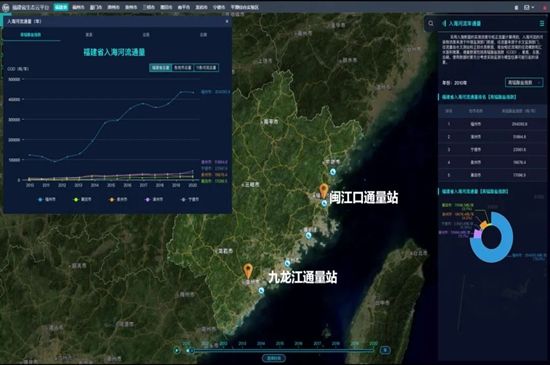
Xiamen University's Marine Monitoring and Information Services Center (MMIS) has introduced the groundbreaking ECOFIMS system for real-time monitoring of carbon and nitrogen fluxes at the Minjiang River estuary in Fujian province. Representing the first unmanned and automated system of its kind in China, this achievement signifies a significant leap forward in ecological monitoring and digital application by the MMIS research team.
By integrating acoustic tomography technology with intelligent modeling algorithms, the ECOFIMS system has overcome the challenges posed by high-frequency and high-precision monitoring in complex estuarine environments. This advancement provides robust technical support and a practical example of integrated land-sea management, emissions reduction, carbon sequestration, and climate change adaptation.

ECOFIMS system interface. [Photo/en.xmu.edu.cn]
Estuarine regions serve as critical conduits for land-based materials entering the ocean, regulating oceanic carbon sinks and climate systems. However, due to complex tidal dynamics, carbon and nitrogen fluxes at estuarine interfaces exhibit rapid and transient changes.
After a decade of collaborative research and development, the MMIS team successfully engineered the ECOFIMS system, which combines innovative acoustic sensing devices with AI algorithms. This system achieved several key technological breakthroughs, including high-frequency synchronous monitoring, intelligent flux calculation, and real-time alerts and statistics.
Currently deployed in rivers and estuaries such as the Jiulong and Minjiang Rivers, the ECOFIMS system offers a new technological paradigm and high-quality data for basin-to-nearshore carbon and nitrogen cycling research and carbon sink assessments.
In the future, the system has the potential to be widely implemented in rivers, estuaries, and bays across China and globally to support accurate carbon sequestration accounting and total nitrogen pollution control, facilitating the development of regional ecological compensation policies.
The successful development and application of ECOFIMS significantly enhances China's influence in combatting global climate change and improving environmental governance.

The locations of the Jiulong River flux station and Minjiang River flux station. [Photo/en.xmu.edu.cn]